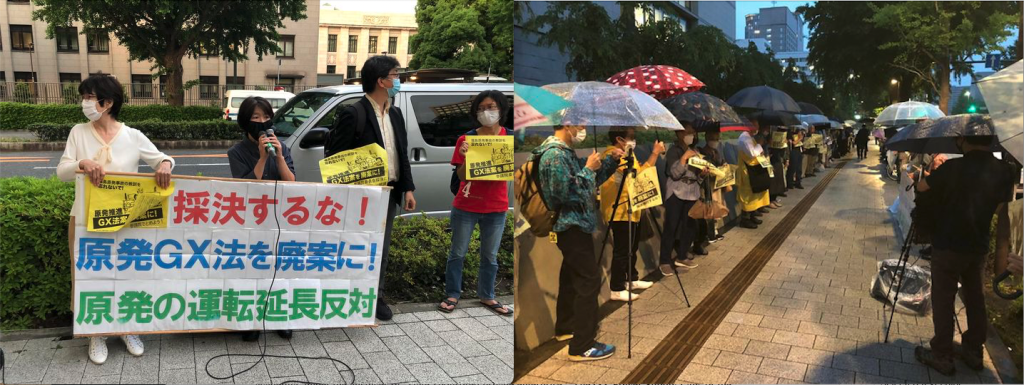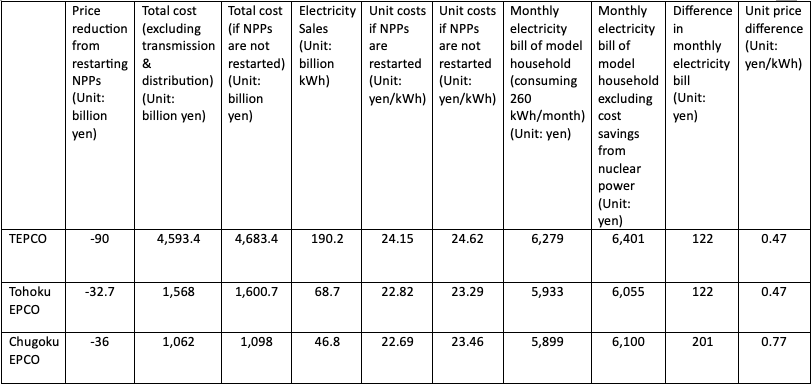31 May 2023
On 31 May 2023, the House of Councilors passed the “GX bundled bill,” including legislation to extend the operation period of nuclear power plants and to promote the use of nuclear power (GX Power Supply Law) at a plenary session of the House of Councilors by a majority vote of the Liberal Democratic Party, New Komeito, Japan Innovation Party (Ishin-no-kai), National Democratic Party and others. For the last several months, many citizens, including CNIC, have repeatedly pointed out the problems with the GX Power Supply Law, which bundles together five laws, including the Atomic Energy Basic Law, the Electricity Utilities Industry Law and the Nuclear Reactor Regulation Law. However, such voices have not been heeded and deliberations have been carried out in an extremely abrupt manner, forced through in order to keep to the government’s timetable. Only 12 years have passed since the TEPCO Fukushima Daiichi nuclear accident, which was the result of the safety myths perpetrated by the state, the nuclear industry and academia, under the auspices of “state-sponsored private enterprise.” The GX Power Supply Law, or the policy of returning to full nuclear power, is being implemented while a declaration of a nuclear emergency is still in force and evacuation orders have not been lifted and tens of thousands of people have been displaced. It is shocking to witness how shallow Japan’s reflection has been.
 Protests against the GX Bill and extending the operating period of nuclear reactors took place outside the Diet building over a number of days and nights. Photos by Maeda Yasuo, one of the protestors.
Protests against the GX Bill and extending the operating period of nuclear reactors took place outside the Diet building over a number of days and nights. Photos by Maeda Yasuo, one of the protestors.Fukushima victims ignored and neglected
What is most problematic is that, for example, the Atomic Energy Basic Law states that “we sincerely regret that we fell prey to the safety myth… and failed to prevent the accident at the TEPCO’s Fukushima Daiichi Nuclear Power Station”, yet not once were the voices of the victims of the Fukushima disaster listened to. This was also the case at the expert hearings held by the Atomic Energy Commission in the process of formulating its “Basic Policy on the Use of Nuclear Energy”, and in discussions at the Nuclear Energy Sub-Committee, an advisory body of the Ministry of Economy, Trade and Industry (METI). The National Explanation and Opinion Exchange Meetings, which were held in 10 locations across Japan after the formulation of the Basic Policy for the Realization of GX, were not held in Fukushima, and during the parliamentary deliberation process, witnesses and Members of Parliament also called for local public hearings in Fukushima, but these were not held either. The “sincere regret” is nothing more than lip service.
Lessons of Fukushima recklessly thrown out
What is even more problematic is that the operation period regulation, which was supposed to have been introduced as a safety regulation in response to the lessons of Fukushima, was transferred from the jurisdiction of the Nuclear Regulation Authority (NRA) to METI. This was done on the grounds that the operation period was originally a restriction established as a part of nuclear power utilization policy, so it has merely been restored to its rightful place. This was done, of course, under the guise of ‘double regulation’ that is, METI will give permission and the NRA will conduct periodical inspections every ten years, thus, according to the government, improving safety. It is clear from the government’s statement in 2012 that the operation period regulation was introduced as a safety regulation. If the government has changed its mind and now claims that the operation period is not a safety regulation, but up to the nuclear operators to regulate, it should explain why. However, NRA Chairman Yamanaka Shinsuke has repeatedly and forcefully stated that the operation period, from its introduction, was a matter of utilization policy.
The revised law excludes long shutdown periods from the operating period, for example, if a plant has been shut down for 10 years, it can be authorized to operate for 10 years in addition to the regulated maximum of 60 years. Such an extension will be granted by METI based on whether or not it is deemed necessary for decarbonization and a stable electricity supply.
As with anything, it is difficult to say for certain when and how a deteriorating facility will break down. However, the longer a facility is in operation, the more it deteriorates. In the absence of a clear boundary between safety and danger, people must make the decision that further operation is dangerous. The NRA has jurisdiction only over nuclear safety. But it cannot be irresponsible in matters of electricity security and decarbonization. Under pressure that the operation of a plant is necessary for electricity security and decarbonization, can it still make decisions on safety first and foremost, with no clear boundaries? Can people who cannot even face up to the past make such tough decisions? This revision to the law is not about increasing safety through ‘double regulation’. It merely restores the pre-Fukushima status quo and weakens the supposed separation of promotion and regulation, it is a means to put more pressure on the regulatory side. To call such a legal reform ‘double regulation’ is just too shameful.
Nuclear power not conducive to stable or low-cost electricity supply
The government and nuclear operators claim that nuclear power provides a stable supply of electricity and lowers electricity prices. But is this really the case? The 2002 cover-up of problems at TEPCO’s nuclear power plants led to the shutdown of all of the company’s plants and a summer power crisis. The 2011 Great East Japan Earthquake and TEPCO’s Fukushima Daiichi nuclear accident eventually led to the shutdown of all nuclear power plants; the prolonged periodic inspections of several of KEPCO’s nuclear power plants had a major impact on the soaring wholesale electricity market during the 2020 winter season.
The resumption of nuclear power plant operations is said to have the effect of a huge reduction in electricity prices. However, according to the electricity price increase applications of operators who expect to restart nuclear power plants, the effect of the price reduction is only 0.47-0.77 yen/kWh, or 122-201 yen per month for a model household’s consumption.

In the case of TEPCO’s Kashiwazaki-Kariwa nuclear power plant, Units 2 and 3 have been shut down since 2007 and Unit 4 since 2008. These are not expected to be restarted in the foreseeable future. Meanwhile, maintenance and refurbishment costs are added to electricity prices, forcing consumers to bear the cost, and according to the annual securities reports of electricity companies for the period 2011-2021, the cost of maintaining nuclear power plants by power companies whose nuclear power plants did not generate a single kWh of electricity in each year amounted to 12.62 trillion yen. This is approximately 100,000 yen per capita. The fact that such a burden continues is in itself extraordinary. Instead, nuclear power plants should be scrapped and costs reduced as soon as possible.
Nuclear power not contributing to CO2 emissions reductions
Nuclear power is considered a decarbonized power source. It is true that the CO2 emissions of nuclear power plants are lower than those of thermal power plants. However, whether this means that nuclear power should be the energy of choice is quite another matter. This is because when nuclear power plants operate, they produce high-level radioactive waste that requires very long-term isolation from the environment, and release other radioactive waste into the environment during operation and when decommissioned. Furthermore, as the global climate crisis intensifies in the future, it has been pointed out that the climate crisis may hinder the stable operation of nuclear power plants. In reality, inland nuclear power plants in France and other countries have been forced to adjust the output of their nuclear power plants due to hotter and decreasing river waters.
The GX basic policy is to start rebuilding nuclear power plants in the early 2030s. Although the G7 agreed to ‘fully or largely decarbonize the power sector by 2035’, new nuclear power plants in particular are not expected to make any contribution at all. In addition, it is extremely unclear whether nuclear power plants that are currently shut down will be able to restart. Despite this, the assumption that nuclear power plants will eventually restart could even curb investment in renewable energy.
Nuclear power plants are not safe and do not contribute to a stable electricity supply, lower electricity prices or reduce CO2 emissions. The attempt to revert back to such power sources under the guise of taking into account the lessons of Fukushima is completely immoral. We once again strongly urge the withdrawal of this revision to the laws.

 1 year ago
80
1 year ago
80
